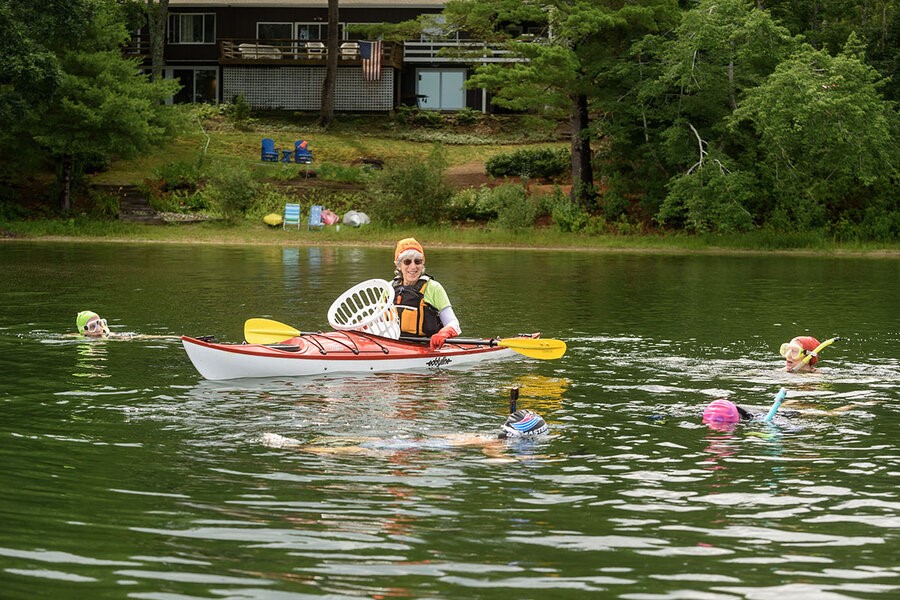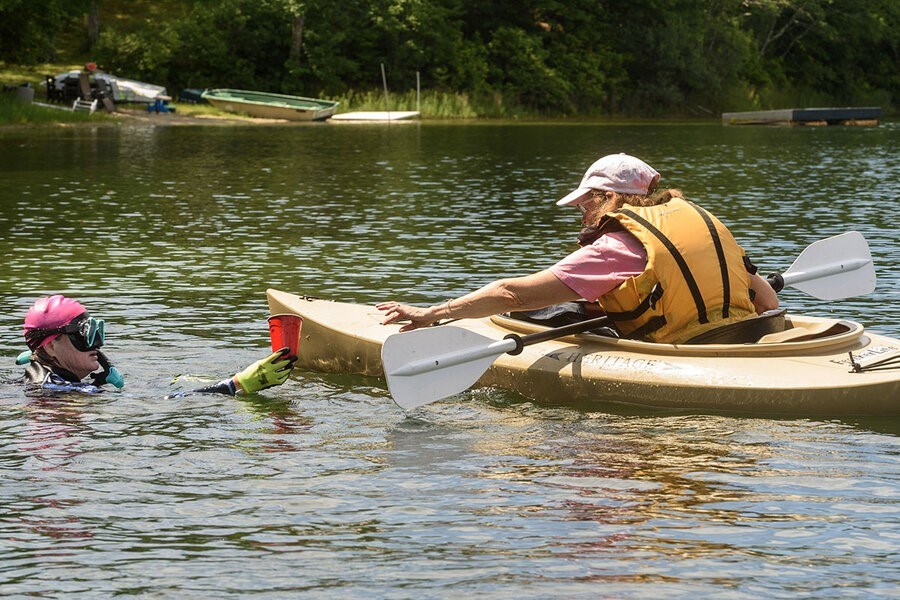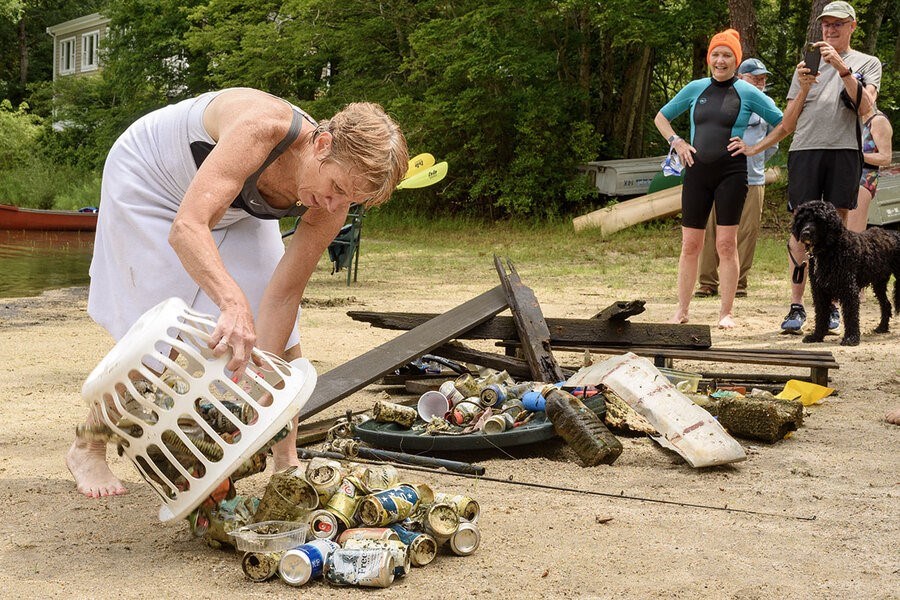The goal, says the founder of Old Ladies Against Underwater Garbage, is to show that older women, working as a team, can do a lot more than people might think. The experience, participants say, is one of reverence.
 Diane Hammer maneuvers a kayak as other members of Old Ladies Against Underwater Garbage hunt for trash during a cleanup at Mares Pond, near Falmouth, Massachysetts, July 15, 2023. Sawyer Pollard
Diane Hammer maneuvers a kayak as other members of Old Ladies Against Underwater Garbage hunt for trash during a cleanup at Mares Pond, near Falmouth, Massachysetts, July 15, 2023. Sawyer Pollard
July 31, 2023 | FALMOUTH, MASS. - The pond is silent – until the first cry: “Found something!” A septuagenarian swimmer ducks into the water. She emerges, fist first, clutching a pair of bright-blue children’s swimming goggles. These are passed to a kayaker, who waggles them overhead, like a prize, before stowing them in a laundry basket for safekeeping.
Over the next hour, on a cloudy Saturday morning in July, the team of 15 – all over age 65, all women – hunts for trash across Mares Pond, a 28-acre kettle hole near Falmouth, Massachusetts, on Cape Cod, at depths of up to 8 feet.
They turn up wooden planks, silty beer cans, a plastic container lid, a mud-caked fishing rod, a cement block, and countless other bits of garbage. The day’s pièce de résistance, though, is a 12-foot segment of aluminum flashing. It requires the combined efforts of several divers to hoist on the back of a kayak.
When the team returns to shore, they are smiling and laughing. They crack jokes about the dive and their haul. “We didn’t even know what it was,” giggles one swimmer, referencing the blueberry-cheesecake-flavored electronic cigarette they found. “We have to ask a young person.”
These are the Old Ladies Against Underwater Garbage (OLAUG). Since 2017, the group – which accepts only older women as members – has removed trash, by hand, from ponds across Cape Cod.
Ostensibly, the group’s primary goal is conservation: It aims to keep the ponds pure for the benefit of both the ecosystem – which includes everything from turtles and herons to grasses and microbes – and its human visitors. But this isn’t all the group is about. As founder Susan Baur, a retired psychologist, puts it: “The litter is the tip of the iceberg.”
Although removing trash is itself valuable work, the women have found another sense of value in the experience of entering, restoring, and then departing a pond. But it’s not exactly easy to put into words.
“I call it the wonderland effect,” Dr. Baur says.
“For most of your life, you have some idea of what you’re doing. You go to a store. ... Cars drive on roads – you know what to expect,” she says. “When you are underwater, it’s like flying. You’re in a different world. And you’re in a world that, in fact, is not an empty bowl of water, [that] is an entire ecosystem which is self-sustaining. Everything fits together.”
The group’s existence is owed to a moment of spontaneity by Dr. Baur. A lifelong nature enthusiast, she had begun swimming in ponds on the cape as a safer alternative to the ocean. However, she found that she “didn’t like them at all.” Between mud, darkness, and snapping turtles, the world of the pond was at first one of anxiety for her.
The only way she could keep her courage up was to rely on markers: “I’d swim to the golf ball, and then swim to the drowned tree, and then swim to the beer can. I love beer cans – they’re easy to spot.”
 Sawyer PollardA swimmer retrieves a plastic cup from Mares Pond and passes it to another Old Ladies Against Underwater Garbage member on a kayak in July. The group, which accepts only older women as members, has been removing trash from ponds across Cape Cod in Massachusetts since 2017.
Sawyer PollardA swimmer retrieves a plastic cup from Mares Pond and passes it to another Old Ladies Against Underwater Garbage member on a kayak in July. The group, which accepts only older women as members, has been removing trash from ponds across Cape Cod in Massachusetts since 2017.
Eventually, Dr. Baur realized she didn’t need the markers anymore – and that they were multiplying. In 2017, on a whim, she rounded up two friends and approached a stranger with a kayak, and together they cleared “half a bushel” of litter from a pond.
“We thought that was fabulous,” Dr. Baur says. (Today, OLAUG wouldn’t bother with a pond with so little trash, she adds.)
In 2019, after Dr. Baur moved to Falmouth, she and her friends dove for trash in a few more ponds. It was during the pandemic, however, that things took off. “It just bloomed,” Dr. Baur says. “Nobody was doing anything but meeting outside. So my entire social life was diving for garbage and walking the dog.”
Peter Donahue is the treasurer of the association for Jenkins Pond, to which OLAUG has now made several visits. “I think they’re incredible,” he says. “They’re very professional. They’re serious about their work, but at the same time, they have lots of fun.”
The cleanups, he adds, have doubled as community events. Dozens of people come out to watch the swimmers work. “What they provide is a tremendous service that any pond would benefit from,” Mr. Donahue says. “And not just from the physical aspect of it, but the community aspect of it, because of their joy and their energy in what they do, and their belief in what they’re doing.”
Like Dr. Baur, the other swimmers have found a sense of wonder in the pond cleanups. “We literally immerse ourselves,” says Robin Melavalin, who was one of the group’s first members. “And it’s a completely different world under the surface. You see fish of all different sizes. You see a bunch of turtles. It’s beautiful. It’s all underwater miracles.”
OLAUG’s efforts began to garner attention. Local news organizations – the Cape Cod Times, then CBS Boston, then NPR on Cape Cod – picked up the story. And with the publicity came a bevy of outsider opinions on the group’s work.
Many expressed their gratitude, but a sizable contingent criticized the group’s name – that they referred to themselves as “old ladies.”
“You should call yourselves the Lovely Ladies Against Underwater Garbage, or the Mermaids Against Glitter Litter,” Dr. Baur, smirking, recalls being told. Others said she should open the group to all ages, to men.
Although she admits that it wasn’t initially a conscious choice, she now believes that the “old lady” identity is a crucial part of what the group is about.
“Over 65, if you’re healthy enough to do what we’re doing, it is the age of gratitude,” Dr. Baur says. “You are so grateful that you can still do this. You’re just grateful anyway, grateful for the trees and grateful for clean water.”
The result, Dr. Baur says, is an environment free of competition, focused on cultivating respect for the pond. “It’s more reverential.”
Dr. Baur notes that “women over 65 tend to feel the constriction of aging.” They lose power and social standing, she says. Part of the goal of OLAUG is to demonstrate that older women, working as a team, can do a lot more than people might think.
Criticism aside, the most common response was one of inspiration: in Dr. Baur’s words, “I want to join you.”
As the group added more like-minded women to its ranks, it also began to take a more systematic approach to cleanups. Rather than just showing up at a pond, OLAUG developed relationships with local pond associations, which supply it with extra kayaks.
 Sawyer PollardAmong the items found in July by swimmers from the Old Ladies Against Underwater Garbage group at Mares Pond are wooden planks, silty beer cans, a plastic container lid, a mud-caked fishing rod, and a cement block.
Sawyer PollardAmong the items found in July by swimmers from the Old Ladies Against Underwater Garbage group at Mares Pond are wooden planks, silty beer cans, a plastic container lid, a mud-caked fishing rod, and a cement block.
In late June, the group held its first “tryouts.” The event was open to any woman over age 65 who identifies with the adventurous spirit of the group. Rather than being a competition, the tryouts ensured that the new recruits could comfortably swim in a pond, dive down, and lug out tires, hunks of wood, and whatever else they found.
The team added 15 new “old ladies,” more than tripling in size. “I have to learn to do spreadsheets,” Dr. Baur says with a sigh.
The cleanup at Mares Pond was the first outing for the new recruits.
Julia Benz, another longtime member and OLAUG’s resident swimming expert, says that the veterans supported the newbies when they struggled. “We had a person today who was ready to give up. We kind of talked her down,” she says. “We’re not looking for the fastest, the best. We’re looking for people who can share each other’s strength to make a good team.”
One of the new members, Maggie Megaw, had a “fantastic” time. “It’s kind of meditative, really, to be swimming with the fish, the turtles and looking at the aquatic plants,” she says.
As the adrenaline of the dive dwindles, the team enjoys Mares Pond-shaped sugar cookies and the newbies receive their very own neon-orange beanies emblazoned “OLAUG.” Their faces spell their glee.
To Dr. Baur, the new swimmers’ excitement makes perfect sense. “They come up and they have just swum farther than they’ve ever swum. They’ve lifted more than they’ve ever lifted. They’ve seen stuff that they’ve never seen. And they’ve done good,” she says. “They come back with their hearts beating.”
Related stories
Page created on 8/31/2023 2:02:25 PM
Last edited 11/1/2023 5:24:56 PM
